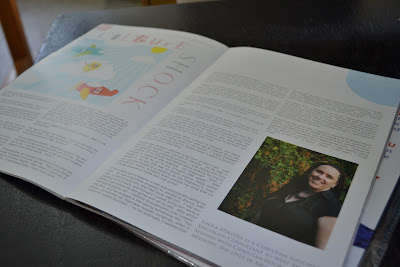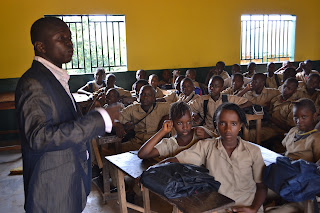I'm featured in a magazine!!
The magazine is published by my friend Lydia Idakula Sobogun. We have been friends pretty much since I first came to Nigeria in 2001. Lydia is passionate about development and social change in Nigeria. She uses her gifts and talents through the entertainment industry.
See a description below taken from Gbagyichild's Facebook Page:
Gbagyichild Entertainment produces events and projects that promote social change and development through the medium of art expressions. Our events enable the projection of a positive image of Nigeria to the rest of Africa and the wider world.
Our vision is to change the world, one art at a time! Our mission is to promote social change and development especially but not restricted to the areas of self employment among youths, cultural exchange, tourism and the preservation of Nigeria's history.
We are the conveners of TARUWA, a monthly gathering of artistic and intellectual minds, which creates a platform for artistes and art lovers to express themselves. On a typical TARUWA evening, we have poets, vocalists, instrumentalists, spoken word artistes, performing. It is always a rich artistic cocktail.
We celebrated 4 years of Taruwa in August last year, and we have had over a hundred shows, and counting. We have been a part of the process of some Nigeria's top artistes like MI, Bez (who actually started his career from Taruwa), Sage Hasson (Nigeria's first recognized spoken word poet) and Chiedu Ifeozo who had his first performance at Taruwa and has since been featured on CNN inside Africa
We also publish the Taruwa Quarterly arts and culture magazine.
Another one of our projects is THROUGH THEIR EYES. A series of photography exhibitions that let us see our society through the eyes of children aged 6-12. We have had two life changing exhibits in Abuja which had among other people, the legendary Tar Uko, and the minister of culture and tourism in attendance.
Through our organization and events, we have given young people a sense of direction with their lives and has also enriched them. We dialogue on how to make our society a better place and we have also done community outreaches to orphanages.
We have attracted a lot of media attention over the years. We’ve been featured on almost every TV station in Nigeria, some of which are broadcasted all over Africa. We’ve also been interviewed/featured in almost every magazine and newspaper in Nigeria and recently on CNN.
We believe that with our relationship with the press and media, our activities and events will naturally gather media attention through out Africa, and globally.
So...back to the magazine article. Lydia asked me to write about my experiences with culture shock coming to Nigeria - and returning to Canada. I am now sharing it below for those of you too far away to buy a copy. And for those of you reading this from Nigeria - you owe me N500 - since you didn't go out and buy your copy to support Lydia!
Foreigner. Expatriate. Third
Culture Kid. Oyinbo. Oniatcha. Batouria.
Many are the labels given to someone living in a “foreign” land.
Culture Shock. Homesickness.
In Transition. Many are the
feelings experienced as one makes a new place home.
"Where are you from?" When did such a simple and straightforward
question become a loaded one? Do you mean where I was born? Where my parents were born? Do you mean where I live? Do you mean where my heart is? And where is my heart...anyways?
Coming to Nigeria was a BIG step.
Little did I know how huge it would be.
I thought I would come and teach for a year and just see how things
went. The changes were a lot.
I would sit in the middle of many a conversation; concentrating with all my might to follow the gist of
what was being shared. It took me MONTHS
to figure out that “I don” is not the same as “I don’t”...in fact that it was
quite the opposite.
One day, I came home excited from
the market to share with my friends the amazing deals and purchases I got on
shoes. I had bargained well, and was
able to get this footwear in six different colours!! Now I could actually
accessorize with my outfits. I had
noticed that Nigerians were much more fashion conscious than I ever was “back
home”. I was looking forward to
launching myself into this new world with my recent purchases. My friend had come over and we were planning
to go out. I proudly put on my new
footwear – that matched wonderfully with my outfit I must say – only for my
friend to look me up and down and say, “You can’t go out like that”.
“Why not?” I asked shocked and confused. Was I not matching well?
“You need to change your footwear. I can’t go out with you looking like that.” Change my footwear? The very thing I was excited about was a flop...but why?
“Those are bathroom slippers.” Bathroom slippers?? My very coordinated flip-flops turned out to be quite the flop. Needless to say...I was well equipped in the bathroom slippers category in the coming months. Hmm!
“Why not?” I asked shocked and confused. Was I not matching well?
“You need to change your footwear. I can’t go out with you looking like that.” Change my footwear? The very thing I was excited about was a flop...but why?
“Those are bathroom slippers.” Bathroom slippers?? My very coordinated flip-flops turned out to be quite the flop. Needless to say...I was well equipped in the bathroom slippers category in the coming months. Hmm!
It was a process, but I learned a
little bit at a time what was socially “acceptable”, and what was not. There were things I grew to love about
Nigeria. Other things I continued to
question. I loved peppery foods. I knew more about Nigerian politics than
Canadian politics. I loved the
colour. The emphasis on respect and
community. I loved it that people were
more important than schedules. Ok, I’ll
admit – I didn’t love this aspect when I arrived at a function ten minutes prior
to the arranged time and find myself waiting an additional hour or two for the
first person to show up.
However, the culture shock was even
greater as I returned to Canada. I was
overwhelmed by the choices everywhere I went.
I was nervous to drive – would I remember to follow the rules? Would I remember not to use my horn? I had to call and make a plan to visit my
friends two weeks before actually going.
I have come to realize that I now
have two homes and two cultures. Neither
of which I completely feel a sense of complete belonging. But both of which I call home.
In Nigeria, I’m moving too
fast. In Canada I’m moving to slow.
In Nigeria, I’m often the only
white person I hang out with. In Canada,
I’m excited when I see a black person (as I live in a rather mono-cultural
community there).
It has taken time. Learning a new culture for me took lots of
listening, observing, and asking lots of questions. I thank God for the great friends that God
sent my way within the first few weeks of being here. Friends who were patient. Friends who looked out for me. And friends who love their nation and made me
fall in love with it too.
It’s not always easy. When I return to Canada, I’m happy to just be “part of the crowd” and not be stared at on the street. I love being close to my family. I enjoy constant light, and knowing what to expect when I reach a junction or need to get a task done.
It’s not always easy. When I return to Canada, I’m happy to just be “part of the crowd” and not be stared at on the street. I love being close to my family. I enjoy constant light, and knowing what to expect when I reach a junction or need to get a task done.
Nigeria has certainly become a
big part of who I am. Last month, my
brother got married in Canada. As he was
in the planning and preparing process, I was telling him how a number of my
friends had talked about making the trip to Canada to come for the
wedding. His response? “Well...I guess it would be ok if you brought
ONE guest.” ONE guest?? Ah yes, this was no longer Nigeria. Funny, it hadn’t even crossed my mind that
I’d only be allowed to invite only one guest!
A few years ago in Nigeria – a
man was persistently calling my line. He
had a business proposal he wanted to discuss with me. I didn’t know him, and had never met him. I was suspecting 419 (fraud), and thought I would
string him along a little to see where he was going with all his talk. After about the fourth phone call – I believe
he suspected I was suspecting him, and he dropped a line saying something like
“You know sometimes we Nigerians suspect ourselves, when it comes to certain
business..” As he continued, I realized that he actually thought I was a
Nigerian and broke out in laughter. I
asked him which only confirmed my suspicions.
In the end, he stopped calling.
But funny enough, I realized I had certainly made progress in my
“Nigerian” English – intonations and expressions – without even realizing it!
Ten years later...I look back at
all my experiences and am so thankful. I
am happy to be able to be part of two cultures and call two places home. I appreciate the person I have become – one able to move around in
different places. Someone who values
different people and different perspectives.
Someone who realizes that things are not always as they appear. Someone who continues to learn – and
appreciates the process of learning.
In fact JUST today – I was
speaking to a group of people about amala.
I was proud of myself for using it as an example in what I was talking
about. Only to have a few people snicker. Apparently my intonation still needs some
work. Instead of talking about the
Yoruba food, I was talking about the
“son of the soil” in Igbo. Oops! I will learn.
"Small small".





























